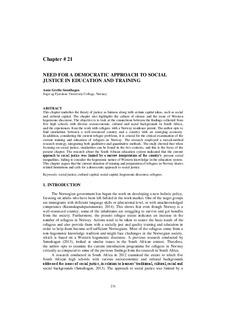| dc.contributor.author | Sønsthagen, Anne Grethe | |
| dc.date.accessioned | 2017-03-14T12:41:06Z | |
| dc.date.available | 2017-03-14T12:41:06Z | |
| dc.date.created | 2017-02-08T13:14:25Z | |
| dc.date.issued | 2016 | |
| dc.identifier.citation | Education Applications and Developments. 2016, 2 231-240. | nb_NO |
| dc.identifier.issn | 2183-2978 | |
| dc.identifier.uri | http://hdl.handle.net/11250/2434071 | |
| dc.description.abstract | Many higher education institutions worldwide require that all academic staff have a professional development plan. Teacher professional development has been regarded as one of the most important factors for improving the quality of both teaching and learning. Therefore it is imperative to use a solid framework evaluating professional development. This chapter aims to provide cooperative management as a comprehensive framework for evaluating the impact of professional development on classroom management. Cooperative management is a voluntary, collaborative process in which a school leader, a teacher and a colleague explore and reflect on learning and teaching practice. Specifically, the suggested model emphasizes the dialectic process with a teacher, a school leader and a colleague that represents the core features of effective classroom management. In this process the teacher, the school leader, and the professional colleague act as feedback receivers and providers. In the suggested model cooperative management has described the residual practice as the core feature of the effective classroom management. The residual practice is the experience or practice left over at the end of the teaching process. The suggested model also fosters the members of the learning community because a residual outcome stays with the school leader, the teacher, and the professional colleague for the rest of their lives. In this study the designed model was implemented and the semi structured interviews were given to five EFL teachers who taught in multilingual classrooms as follow-up. The findings indicated that the suggested model helped the participant EFL teachers develop new perspectives in their classroom management strategies and contributed to their professional development. Furthermore, some implications were provided for school leaders as well as for teachers in Cyprus. | nb_NO |
| dc.language.iso | eng | nb_NO |
| dc.relation.uri | http://press.insciencepress.org/index.php/press/catalog/book/9 | |
| dc.title | Need for a democratic approach to social justice in education and training | nb_NO |
| dc.type | Journal article | nb_NO |
| dc.type | Peer reviewed | nb_NO |
| dc.source.pagenumber | 231-240 | nb_NO |
| dc.source.volume | 2 | nb_NO |
| dc.source.journal | Education Applications and Developments | nb_NO |
| dc.identifier.cristin | 1448441 | |
| cristin.unitcode | 216,30,0,0 | |
| cristin.unitname | Avdeling for lærarutdanning og idrett | |
| cristin.ispublished | true | |
| cristin.fulltext | original | |
| cristin.qualitycode | 1 | |
